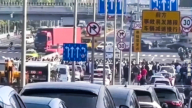【新唐人2011年10月16日訊】貴州省一所小學被發現給學生霉爛食物當午餐,引發近千人堵路抗議。大陸學校利用「黑心食堂」牟利的現象,已經不是單一的問題。有民眾質問,政府說孩子是祖國的未來,卻給他們連豬都不能吃的爛菜,中國的未來到底在哪裏?
10月13號早上,貴州省遵義市東風小學家長發現,一車給孩子們做午餐用的材料,白菜青椒已經腐爛流著液體﹔茄子已經打蔫﹔白菜最表層全是菜梆爛葉﹔豬肉是槽頭肉。家長們憤怒不已,將這些爛菜搬到街道中間,大曝學校食堂黑心之舉。
越來越多家長聚集在校門口,最後圍觀群眾多達上千人,造成學校附近交通堵塞。當天直到下午1點30分,圍觀人群才散去。
有家長說,她的孩子已經一個禮拜吃不下飯,有噁心反應,天天拉肚子。
東風小學家長:「這種做的惡劣的話,可能會食物中毒,影響小孩的身體健康。長時間吃的話會不會對這個小孩未來怎樣,會不會帶來其他疾病,或者大面積的食物中毒,或者有很多不堪想像的事情發生,或者都能夠影響小孩的終身的。」
據了解,東風小學食堂已經由私人承包四年,學生每月交148元,每天吃一頓中餐,算下來,每餐七元左右。
曾經擔任教師的「民生觀察」網站負責人劉飛躍指出,大陸很多學校都是從食堂方面賺取收入。
劉飛躍:「大陸的中小學,甚至大學和其他學校,學生食堂是一個學校很重要的收入,甚至是很主要的收入,學校有很多的經費,如老師的工資,都是靠食堂的收入,沒有這個收入學校的運作可能就有問題。肯定學校對這種收入是多多益善,當然造成很多學校剋扣,謀取更多利益,這是很普遍的現象。」
目前大陸媒體報導,東風小學校長喻榮堂已經被免職。
東風小學「黑心食堂」事件迅速在媒體和網上引起關注。有網友透露:「這種現像在廣大的貴州中小學校是普遍存在的,用的油、食材在品質上都有一定問題,老師敢怒不敢言,悲哀啊!」
一網友表示:現在的政府和學校很可恨,天天說孩子是祖國的未來,天天餵不能餵豬的腐爛的菜,我不知道中國的未來在甚麼地方。
劉飛躍認為,歸根究底,學校出現「黑心食堂」,主要是政府投入的教育資源不足。
根據聯合國數統計,中國在確保人民受教育權利方面甚至不如非洲烏干達、加納等窮國。根據國家統計局公布的數據計算,從2000年到2009年10年間,中國財政性教育經費支出佔GDP的比例不到4%。而在2009年,中國的教育支出僅為8,033億元,遠遠低於中共官員公車消費、公款吃喝、公費出國的「三公」消費1萬4千億元。
新唐人記者吳惟、蕭宇綜合報導。
School Food Poisoning Scandal Rocks China |
A primary school in Guizhou Province has been reportedly
serving rotten food to students for lunch.
News of the incident triggered massive street protests.
Schools in mainland China reap a profit by maintaining
“black heart cafeterias” is not an isolated problem.
People wonder if the present generation of
Chinese children is really the future of the country.
If they are being served food that pigs wouldn』t dare eat,
where on earth does China』s future lie?
On October 13, some Dongfeng Primary School
student』s parents discovered a truck full of rotten food,
which they believed was going to be served to the students.
The cabbages and green peppers were terribly rotten and smelly;
the eggplants were all withered, and the pork was bad quality.
Angry parents took the food off of the truck
and put it in the middle of the street to expose
the black hearted intention of the school』s cafeteria.
More and more parents gathered in front of the school gate.
Finally, thousands of people gathered, causing a traffic jam.
People did not leave until 1:30 p.m. that day.
One parent said that her child was suffering from nausea
and diarrhea and hasn』t been able to eat for a week.
Some parents of Dongfeng Primary School students said:
“If it gets worse, it could lead to food poisoning,
which would surely affect the children』s health.
If it is not stopped, it could affect the children of the future,
or develop other diseases as a result, or severe food poisoning.
Many things that we can』t bear to imagine could happen.
The effects could last a lifetime.”
It is believed that the Dongfeng cafeteria services
have been privately contracted for four years.
Students pay RMB 148 (US$23.20) per month for lunch,
or about RMB 7 (US$1.10) per meal.
Chairman of the Civil Rights and Livelihood Watch website
and former teacher, Liu Feiyue, pointed out that many schools
in mainland China earn money from cafeteria sales.
Liu: “Cafeterias are an important way for primary schools,
high schools, and even universities and other schools
in the mainland to earn money.
In many cases it is a school』s main source of income.”
Since schools have a lot of expenses, such as teachers』 salaries,
they all rely on cafeteria profits to keep them afloat.
Many schools would not make it without this extra income.
Schools think the more money they make, the better.
It is common for many schools to serve as small portions
of food as possible, thus reaping more profit..
According to mainland China media,
the principal of Dongfeng,Yu Rongtang has since been fired.
This black heart cafeteria event quickly caught the attention
of netizens and the media, with one netizen commenting:
“This phenomena is very common in primary and high schools
in Guizhou Province.
The cafeteria』s most food groups have quality control issues,
which is making the teachers very angry.
The fact that they dare not talk about their feelings
makes the whole situation very pathetic.”
One netizen said: “Both the government and schools are hateful.
They tell us everyday that children are the future of our country,
but they feed them rotten vegetables that a pig wouldn』t eat.
I don』t know where the future of China lies!”
Liu Feiyue believes that the leading cause is
the government』s lack of investment in education.
According to U.N. statistics, in the area of education,
China is worse off than some poor African countries,
such as Uganda and Ghana.
National Bureau of Statistics figures show that
from 2000- to 2009, China’s fiscal education expenditure was
less than 4 percent of the country』s GDP.
In 2009, China’s education expenditure
amounted to only RMB 803.3 billion (US$125.9 billion),
far below the RMB 1,400 billion (US$219.5 billion)
per Chinese Communist Party official』s public funds
for cars, entertainment, and traveling abroad.
NTD reporter Wu Wei and Xiao Yu




























